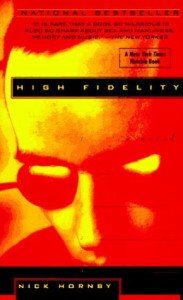 Hornby, Nick. (1995). High Fidelity. New York: Riverhead Books/Penguin.
Hornby, Nick. (1995). High Fidelity. New York: Riverhead Books/Penguin.
Well-written, Non-nutritive
Imagine a character, thirty-five, who has the mind of a fifteen year-old. Would that be funny? It is mildly amusing in High Fidelity. Rob runs an obscure, used-record store that barely survives and he is obsessed with popular music. His two slacker buddies are equally obsessed, but they are only reaction characters for Rob’s rants and reflections. First-person narration is always a challenge, because nobody is interesting enough to listen to for 300 pages. Even Humbert Humbert and Sam Spade became tedious, and Rob, as a small-minded whiner, achieves that status very quickly.
His longtime girlfriend abruptly leaves him, so he makes a list of his top five most traumatic breakups. Top five lists are the main driver of the humor in the novel. Top five episodes of Cheers, top five pop records, top five worst records, top five pop songs about death, top five dance tunes, and so on, interminably. The reader sees that Laura left him because Rob is a directionless, unambitious loser, but Rob worries that it was about his sexual performance, so he obsesses about sex, and romance, and how to impress girls, and he indulges all the self-absorbed gender angst you would expect from a young teenager, except again, Rob is 35. It’s pathetic rather than funny.
I understood most of the pop culture references, but was indifferent to them. Pop culture, is by definition, light and frothy stuff, the background noise to a life. But for Rob, it is life. Someone who believes that is not likely to be reading a book like this, so by design, this novel had to fall flat.
Much of the writing is tight, well-observed, wry, and original; strong enough to pull you through the pages to the end. For example, Rob (a Brit) had sex one night with an American woman, who later unexpectedly shows up at his shop to say hello. He is surprised.
“This, it seems, is what you get for sleeping with an American, all this up-front goodwill. You wouldn’t catch a decent British woman marching in here after a one-night stand. We understand that these things are, on the whole, best forgotten. But I suppose Marie wants to talk about it, explore what went wrong; there’s probably some group counseling workshop she wants us to go to, with lots of other couples who spent a misguided one-off Saturday night together” (p. 189).
Another: Rob has dinner with a well-educated and prosperous couple.
“We eat stuff I don’t know about, and neither … comments on each bottle of wine we drink apart from the one I brought. The difference between these people and me is that they finished college and I didn’t … as a consequence, they have smart jobs and I have a scruffy job, they are rich and I am poor, they are self-confident and I am incontinent, they do not smoke and I do, they have opinions and I have lists. Could I tell them anything about which journey is the worst for jet lag? No. Could they tell me the original lineup of the Wailers? No.” (p. 199)
Overall, the writing is to be admired, and the book is worth reading for that. At the end, you feel like you ate marshmallows for dinner.
